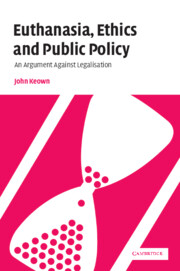Book contents
- Frontmatter
- Contents
- Preface
- Foreword
- Acknowledgments
- Table of cases
- List of abbreviations
- Introduction
- PART I Definitions
- PART II The ethical debate: human life, autonomy, legal hypocrisy, and the slippery slope
- PART III The Dutch experience: controlling VAE? condoning NVAE?
- PART IV Australia and the United States
- PART V Expert opinion
- PART VI Passive euthanasia: withholding/withdrawing treatment and tube-feeding with intent to kill
- Conclusions
- Afterword
- Bibliography
- Index
Afterword
Published online by Cambridge University Press: 20 July 2009
- Frontmatter
- Contents
- Preface
- Foreword
- Acknowledgments
- Table of cases
- List of abbreviations
- Introduction
- PART I Definitions
- PART II The ethical debate: human life, autonomy, legal hypocrisy, and the slippery slope
- PART III The Dutch experience: controlling VAE? condoning NVAE?
- PART IV Australia and the United States
- PART V Expert opinion
- PART VI Passive euthanasia: withholding/withdrawing treatment and tube-feeding with intent to kill
- Conclusions
- Afterword
- Bibliography
- Index
Summary
In late 2001, the English courts were confronted with the claim that a right to assisted suicide is guaranteed by the European Convention on Human Rights for the Protection of Human Rights and Fundamental Freedoms. The claim was made by Mrs Diane Pretty, aged 42. She was diagnosed in November 1999 with motor neurone disease, the same terminal neuro-degenerative illness that afflicted Sue Rodriguez. Mrs Pretty's condition deteriorated rapidly and, though her intellect remained unimpaired, she became paralysed from the neck down. She had only months to live. Frightened at the prospect of a distressing death, she wanted her husband to help her commit suicide at a time of her choosing. He was willing to do so, but only if he could be sure he would not be prosecuted for assisting suicide contrary to section 2(1) of the Suicide Act 1961.
Under section 2(4) of the Act, prosecutions may be brought only with the consent of the Director of Public Prosecutions (DPP). Mrs Pretty asked the DPP to give an undertaking that he would not prosecute her husband. The DPP refused and Mrs Pretty challenged his refusal by way of judicial review. She sought an order quashing his refusal and requiring him to give the undertaking or, alternatively, a declaration that the Suicide Act was incompatible with the European Convention on Human Rights.
The Divisional Court unanimously dismissed her claim. It held that the DPP had no power to give the undertaking sought.
- Type
- Chapter
- Information
- Euthanasia, Ethics and Public PolicyAn Argument Against Legalisation, pp. 282 - 291Publisher: Cambridge University PressPrint publication year: 2002

